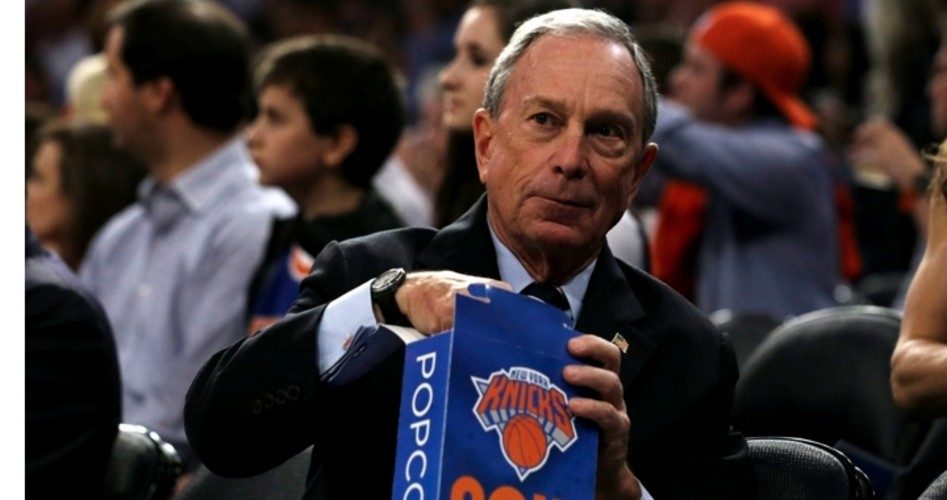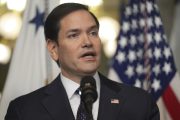
New York Mayor Michael Bloomberg (shown) has been named Reason magazine’s “Nanny of the Month” for May, marking the third time the controversial thee-term mayor has earned that distinction, the libertarian publication said. The latest “award” is based on the city’s regulation of the sale of toy guns and the $60,000 fine levied against the owner of a Manhattan tourist shop for selling cigarette lighters shaped like tiny pistols.
“The lighters are just three inches in length, but the city’s Department of Consumer Affairs says they could be mistaken for real firearms,” Reason said. In addition to his three monthly “awards,” Bloomberg was named the magazine’s “Nanny of the Year” in 2009, when the health-conscious mayor proposed a ban on outdoor smoking and a one-cent tax on sodas. His crusade against sugar-laden food and drinks included a public campaign against school bake sales and a program to encourage food processors to use less salt. That followed a 2007 ban on the use of trans fats, along with a public campaign against school bake sales.
The smoking ban went into effect in 2011, making lighting up illegal in any of the city’s 1,700 parks and 14 miles of beaches, as well as in pedestrian plazas like Times Square. Last year, the mayor asked city hospitals to put infant formula bottles in storage to encourage mothers of newborns to breast feed. A ban on the sale of large sugary soft drinks, imposed at the mayor’s urging by the city’s Board of Health, was struck down earlier this year by the state’s Supreme Court.
Fred Shayes, who was nailed for the cigarette lighters, said the fine could put him out of business. Shayes was fined $5,000 for each of the 12 pistol-shaped lighters he had in the store. He has appealed to the Manhattan Supreme Court in an effort to block city efforts to collect the 60 grand.
“We don’t have the money,” Shayes told the New York Post. “I would have to take a loan out from the bank to pay that.” Shayes was selling the lighters for $10 apiece until city investigators removed them from his store shelves, the Post said.
A legible stamp identifying the manufacturer or trade name is required on all toy guns, though it might have been difficult to fit a name on the novelty lighters Shayes was selling, since they are small enough to fit in the palm of a hand. The bronze silver and black items also run afoul of the “range of acceptable colors” for an “imitation firearm” under the city’s Public Safety Law. The acceptable colors include white, bright red, bright orange, bright yellow, bright green, bright blue, bright pink, or bright purple.
The billionaire mayor is reported to have committed a sizable chunk of his personal wealth to a campaign about real guns. Earlier this year, Bloomberg and the group he organized, Mayors Against Illegal Guns, launched a $12 million TV ad campaign in favor of expanded background checks and against politicians who have voted against them.
Guns are also the target of the New York Police Department’s controversial “Stop and Frisk” program, which the mayor insists is a major contribution to public safety. The New York Civil Liberties Union, after examining police department records, reported in 2011 that guns were found in just 0.2 percent of all stops. The report also showed 87 percent of all stops were of African-American and Latino males, even though the smaller number of white males stopped were twice as likely to have guns. The study also showed no correlation between the number of stops made and the public’s safety from gun violence. In 2002, when there were 97,296 stops, there were 1,892 victims of gunfire in the city. In 2011, there were 685,724 stops and 1,891 deaths by gunfire. The mayor responded to the report by calling the civil liberties groups “no better than the NRA.”
“Let’s be clear,” Bloomberg said. “The NYCLU’s priority is not protecting our safety, it is protecting their ideology. And in that regard, they are no better than the NRA.”
The Associated Press last year reported, based on interviews and a secret police document that the news agency obtained, that the New York Police Department had been conducting surveillance on Muslims and mosques “from Connecticut to the Philadelphia suburbs.” If you think Connecticut or Philadelphia might be outside the jurisdiction of New York’s police force, think again: “The NYPD has officers stationed in 11 foreign cities such as London, Paris, Madrid, and Tel Aviv, where they work with local police and act as the NYPD’s eyes and ears overseas,” the AP reported. Given its global reach, it’s not surprising that the mayor should be tempted to exaggerate when he boasts of the size of his “own army.”
“I have my own army in the NYPD, which is the seventh biggest army in the world,” Bloomberg said in a 2011 speech at the Massachusetts Institute of Technology. The city’s force of more 34,000 is impressive, but does not equal the manpower of the world’s “seventh biggest army.” That distinction, according to globalsecurity.com goes to Pakistan, which may still be beyond the Mayor Bloomberg’s jurisdiction.
The city’s ban on the sale of large (more than 16 oz.) soft drinks in self-service cups at food service establishments was what the New York Times called “a centerpiece of Mayor Bloomberg’s third term.” It also provided fodder for late night comedians. But in ruling the ban “arbitrary and capricious,” New York Supreme Court Judge Milton A. Tingling also found it a violation of the separation of powers in the City Charter. The mayor bypassed the City Council and got the ban approved by the city’s Board of Health, which lacked the legislative authority to approve such a measure, the judge ruled. The decision came on March 11, one day before the ban would have taken effect. It came in response to a suit, brought by associations of grocers, restaurateurs, theater owners, and others against the Board of Health and the Department of Health and Mental Hygiene, the city department charged with enforcing the ban.
“To accept the respondents’ interpretation of the authority granted to the Board by the New York City Charter would leave its authority to define, create, mandate and enforce limited only by its own imagination,” the judge wrote. “The Portion Cap Rule, if upheld, would create an administrative Leviathan and violate the separation of powers doctrine. The rule would not only violate the separation of powers, it would eviscerate it. Such an evisceration has the potential to be more troubling than sugar sweetened beverages.”
Bloomberg vowed to appeal the decision, claiming his responsibility to New Yorkers includes protecting their health. “This includes advising them when science says something they’re doing may be harmful to them or to their families,” he said.
But clearly Bloomberg wants to go beyond advising people on such matters. He wants to use the force of law to compel them to follow his advice. And as the judge’s ruling indicated, the mayor may not be the most reliable guide on following the law.
Photo of New York Mayor Michael Bloomberg: AP Images


